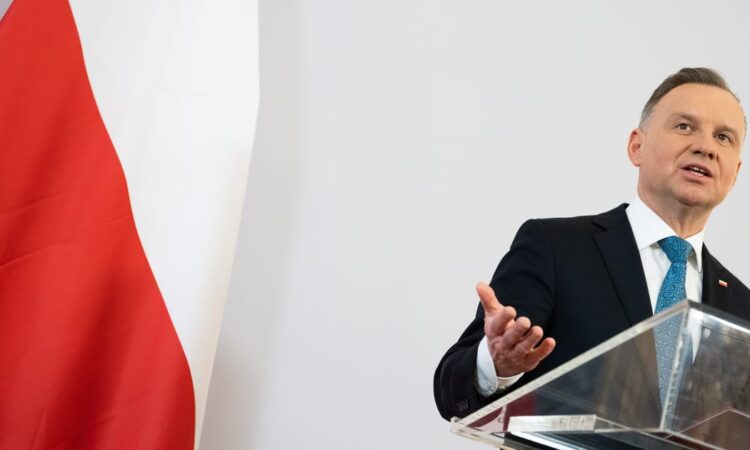
Press play to listen to this article
Voiced by artificial intelligence.
WARSAW — Poland’s government is desperate to unlock €36 billion in grants and loans from the EU’s pandemic recovery fund, but to get the cash it needs to finalize a law rolling back legal reforms that Brussels said undermined judicial independence.
The problem?
President Andrzej Duda in February sent the bill to be examined by the Constitutional Tribunal but the court has been unable to gather a quorum of 11 out of 15 judges because it’s locked in a civil war. That’s delaying both the money and the effort by Warsaw to improve its poisonous relations with Brussels ahead of this fall’s parliamentary election.
At least six judges say the six-year term of the tribunal’s President Julia Przyłębska has expired and that she’s no longer in charge. When Przyłębska — a rumored close friend and lunch companion of Law and Justice (PiS) party boss and Poland’s de facto ruler Jarosław Kaczyński — tries to summon them for hearings on the legislation, they don’t show up.
In a bid to do an end-run around the blockading judges, PiS MPs have put forward a bill that lowers the quorum from 11 to nine.
“We are dealing with the completely improper attitude of a few judges who claim that President Julia Przyłębska is not the president of the [Constitutional Tribunal],” Kaczyński told Polish radio on Wednesday.
The dispute comes to a head next week. Parliament is due to start working on the legislation during a session scheduled for May 24-26, while Przyłębska will try yet again to summon a quorum on May 30.
But both the opposition and PiS’s right-wing coalition allies smell a rat.
“Just when we thought things couldn’t get any worse with the Constitutional Tribunal and the Polish judiciary,” PiS is “trying to further ridicule the constitutional organs of the state,” said Krzysztof Gawkowski, the parliamentary leader of the Left opposition party, accusing Kaczyński of trying to change the court’s rules because he controls only nine judges.
To make matters even more complicated for PiS, the six judges are seen as being close to Justice Minister Zbigniew Ziobro, the leader of PiS’s smaller Euroskeptic coalition partner, the newly renamed Sovereign Poland, which is opposed to any retreat in the spat with Brussels over rule of law and judicial independence.
Ziobro denies any meddling.
“I would never dare encroach on the authority of bodies and individuals beyond my authority,” he said last week, adding: “Any insinuation that suggests that the justice minister has anything to do with the ongoing dispute in the [Constitutional Tribunal] is completely without foundation.”
Political battle
The opposition is pointing fingers at both parties.
“Mr. Kaczynski’s social discovery has quarreled with Mr. Zbigniew Ziobro’s social discovery and it’s costing us 170 billion złoty,” Warsaw Mayor Rafał Trzaskowski, one of the leaders of Civic Platform, the largest opposition grouping, told a rally in Kraków on Monday.
The European Commission is unlikely to decide on releasing any funds until the judicial reform bill is law, as it’s crucial to meeting the so-called milestones agreed between Brussels and Warsaw.
“Today, the key to fulfilling the last milestone lies in the decision of the Constitutional Tribunal,” Europe Minister Szymon Szynkowski vel Sęk told Polish radio on Tuesday, adding that if the justices “do not feel able to adjudicate, they should resign.”
The deadlock over the tribunal dates back to late 2015, immediately after PiS came to power. One of its first acts was to reject three judges legally appointed by the previous parliament and substitute them with three new judges sworn in by Duda. That set off months of intense battles with the tribunal — during which the government raised the quorum from nine to 11 judges to ensure that the disputed judges would have a seat at the table.
Now, faced with a different challenge, the government wants to roll back those earlier changes.
“Not so long ago the full quorum was nine judges, later it was raised to 11,” Kaczyński said. “We want to go back to nine.”
Legal experts say that’s further undermining the already tarnished reputation of the tribunal — which is supposed to rule on the constitutionality of laws passed by parliament but is now seen as a creature of the ruling party.
“I wouldn’t even analyze the proposal in legal terms. It’s about getting a political issue done and over with — the tribunal is expected to give a ruling to unblock money from the EU,” said Marcin Krzemiński from the department of constitutional law at Jagiellonian University in Kraków.
“Looking at it from the standpoint of constitutional law is like discussing whether a doctor who kills his patients shows up at work on time. It’s irrelevant,” Krzemiński said.






